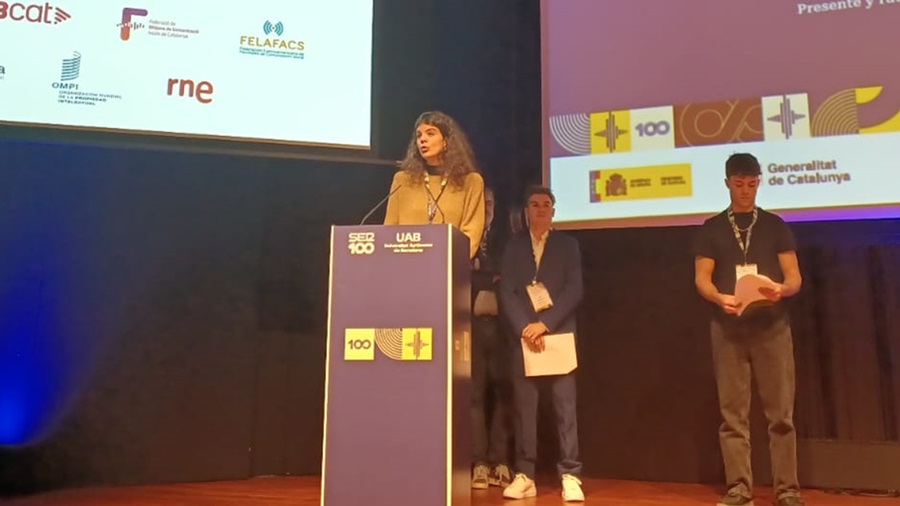Manifesto defends the radio as "the free voice of free societies"
On 16 November, the International Radio Congress came to a close with the reading of the manifesto "La veu lliure de les societats lliures" [The Free Voice of Free Societies], a text that defends the radio's "extraodrinary capacity to adapt to change" both throughout these 100 years of history and in a present which is marked by the development of digital and interactive technologies, a surge in podcasts and artificial intelligence.

The manifesto calls for "a rigorous, transparent and independent radio" which plays "a relevant role in defending democratic values", and works towards media literacy and a radio of proximity. The document was read by Clàudia Arcarons, Pol Batalla, Max Riberas and Lola Santiago, four communication studies students who, according to Dean Enric Marín, "represent the future of radio".
Faculty of Communication Studies Dean Enric Marín emphasised that the legacy of the congress was reflected in the manifesto and in the publication of the UAB Communications Institute providing all the contents of the congress' presentations and debates. Jaume Serra, PRISA Media delegate in Catalonia, thanked the speakers for their participation in the congress and praised the collaboration between the academic and professional sectors that has led to the organisation of the congress.
MANIFESTO:
The Free Voice of Free Societies
Radio was the first means of social communication that took advantage of the radioelectric spectrum to reach every home, every corner. Radio was the beginning of modernity, characterised by electronic communications of proximity and universal access.
Very quickly the radio became a powerful support for information, cultural dissemination and entertainment. A device for close communication and companionship that has contributed to social integration and has helped to combat unwanted loneliness.
In the hundred years since the first broadcast of Ràdio Barcelona, radio has shown an extraordinary capacity to adapt to change. However, today we live in times of accelerated technological transformations in the field of communications that make it necessary to reflect critically on the present and the future of radio, of audio. For this very reason, we declare:
1. Radio, universal and free, whether publicly or privately managed, is a fundamental tool for the strengthening of democracy. Radio must play a relevant role in the defense of democratic values such as ideological plurality, linguistic and cultural diversity, and social cohesion. Rigorous and responsible communication is a natural accomplice of democracy.
2. Radio is the information medium that best communicates in real time. Faced with the dangers of misinformation, it has the opportunity to remain faithful to the values that have made it a long-lasting and trusted option thanks to its high credibility. More than ever, it is essential to demand a quality radio with rigour, transparency and independence.
3. In an increasingly fragmented and deregulated communication system, it is urgent to promote media literacy from the early stages of education so that young people can distinguish between reliable channels and channels that misinform. Media literacy should be extended to society as a whole.
4. As it has traditionally done, radio needs to deploy all its capabilities to reach young audiences. Innovation in consumer networks and platforms offers the opportunity to reach new audiences and capture them through radio.
5. Proximity radio is a tool for regional cohesion with a capacity to create community that no other medium has. It is necessary to create the conditions that allow it to develop its activity, regardless of the size of the audiences and the markets to which it is directed.
6. As a key cultural industry, and as a creator of content, radio requires legislation that offers legal certainty, protection of intellectual property rights and a response to the challenges of new formats and technologies. Radio is an extraordinary promoter and disseminator of culture and music. It is culture in the truest sense of the concept, and this is how it should be perceived by all levels of government, which should reinforce the role of radio in its function of fostering talent and creativity.
7. Radio is, and will continue to be, a unique medium for advertising communication thanks to the creative capacity of sound. Paradoxically, it does not yet have the weight in the advertising market that would correspond to its social penetration and communicative effectiveness. We appeal to the responsibility of the advertisers who, with their advertising investment decisions, contribute to guaranteeing democratic sustainability.
8. Interactive digital communication technologies have multiplied the distribution and listening capacity of radio. In this context, regulators should prevent the consolidation of technological oligopolies that could exclude it from the emerging distribution systems, breaking the direct relationship with listeners.
9. According to the image suggested by Iñaki Gabilondo in this congress, radio has historically functioned as a “mother ship”. This was the case with music, when it went from traditional radio content to having its own channel. Today, with podcasts, audio producers have multiplied their capacity to develop innovative formats that enrich the radio industry by reaching new audiences.
10. Radio faces a great challenge with the emergence of artificial intelligence. It is essential to master the potential of this technology that is opening a new era in the field of content generation and distribution. This challenge will become a great opportunity if it is faced with knowledge, innovative capacity, ethics and social responsibility.
In its 100 years of history, radio has faced and adapted to social and technological changes. The congress concludes with the conviction that radio will continue to do so in the coming decades.
Barcelona, 16 November 2024
The UAB, with Sustainable Development Goals
Quality education
Sustainable cities and communities